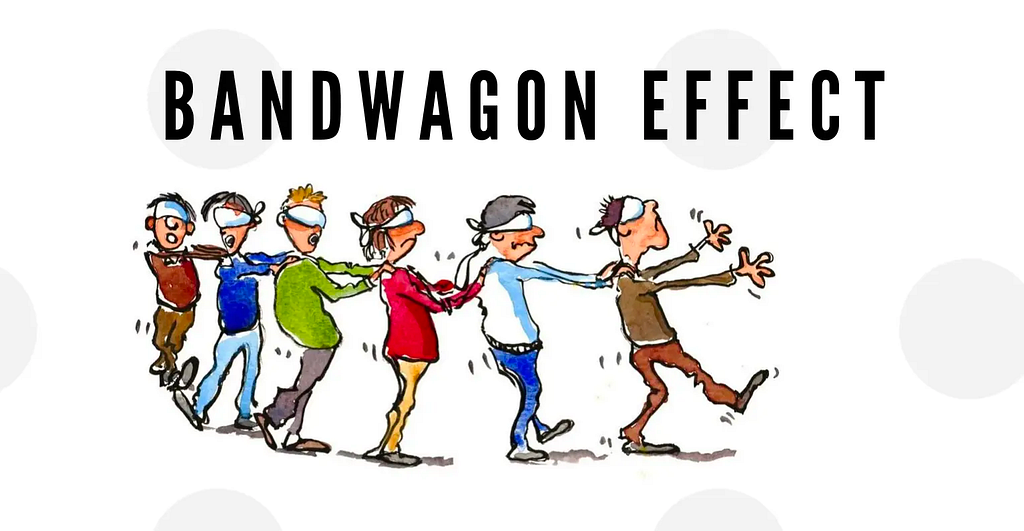
In the dynamic tapestry of human behavior, the bandwagon effect emerges as a captivating psychological phenomenon that intricately influences our decisions, preferences, and even our belief systems. Rooted in the idea of jumping on the bandwagon, this cognitive bias unveils the tendency of individuals to adopt certain behaviors or beliefs simply because others around them are doing the same. In this comprehensive exploration, we’ll delve into the multifaceted nature of the bandwagon effect, examining its pervasive impact on society and unraveling the intricate threads that shape our decision-making processes.
Defining the Bandwagon Effect
The bandwagon effect can be succinctly defined as a cognitive bias wherein people are inclined to adopt certain behaviors, trends, or beliefs due to the perception that they are popular or widely accepted by others. Essentially, individuals “jump on the bandwagon” in a bid to conform to social norms or align themselves with a perceived majority. 🤔 👥
Social Proof and the Bandwagon Effect
At the heart of the bandwagon effect lies the concept of social proof — the phenomenon where individuals look to others to validate their choices and actions. When people witness a substantial number of others endorsing a particular idea, product, or behavior, they interpret it as a signal that this choice is the right one. This validation becomes a powerful motivator, prompting others to follow suit, creating a cascading effect. 🔄 💬
Examples in Everyday Life
The bandwagon effect manifests itself across a spectrum of our daily lives. From the realm of fashion trends and consumer preferences to the intricate web of political opinions and burgeoning social movements, its influence is pervasive. Consider the popularity of a particular smartphone model — if it gains widespread adoption, more individuals may be inclined to purchase it, even if they haven’t thoroughly researched its features or benefits. 📱💼
In the political arena, candidates who gain early momentum often experience a snowball effect as more people rally behind them simply because they perceive the candidate as a frontrunner. The advent of social media platforms has amplified the bandwagon effect by showcasing popular opinions and trends, creating a virtual bandwagon that users may find tempting to join. 🗳️📢
Overcoming the Bandwagon Effect
Recognizing the bandwagon effect is the first step toward mitigating its influence on decision-making. Encouraging critical thinking, promoting independent research, and fostering a willingness to challenge popular opinions can help individuals make more informed choices. Embracing diversity of thought and celebrating individuality can also contribute to breaking the cycle of conformity. 🧠 🌈
Reasons Why People Follow:
- Social Validation:
Humans have an inherent need for social validation. Being part of a group that shares similar opinions or engages in common activities provides a sense of belonging and acceptance. The bandwagon effect taps into this fundamental human desire, making people more likely to conform to prevailing trends to gain approval from their peers.
2. Fear of Missing Out (FOMO):
The fear of missing out is a powerful motivator. When individuals see others participating in an activity or adopting a trend, they worry about being left out of the experience or not being part of something significant. This fear drives them to join the bandwagon, even if they may not have a deep personal interest in the matter.
3. Informational Influence:
In uncertain situations, people often look to others for guidance. When a substantial number of individuals are already following a particular trend, it signals to others that there must be something worthwhile or valuable about it. This informational influence prompts people to jump on the bandwagon, assuming that the collective wisdom of the crowd is a reliable indicator of what is right or beneficial.
4. Reducing Cognitive Dissonance:
Cognitive dissonance refers to the discomfort one feels when holding conflicting beliefs or attitudes. To alleviate this discomfort, individuals may adjust their own beliefs or behaviors to align with those of the majority, thus reducing the internal conflict. Following the bandwagon allows people to maintain a sense of consistency within themselves and with the larger social context.
Conclusion
The bandwagon effect stands as a formidable force shaping our behaviors and choices in various facets of life. While it is natural to seek validation from others, being aware of this cognitive bias empowers individuals to make decisions based on thoughtful consideration rather than blindly following the crowd. In a world where trends and opinions can swiftly become viral, understanding the bandwagon effect is key to fostering independent thinking and cultivating a more diverse, resilient, and intellectually vibrant society. 🌍 🚀
What’s Bandwagon Effect 🚂? Why People Follow was originally published in UX Planet on Medium, where people are continuing the conversation by highlighting and responding to this story.